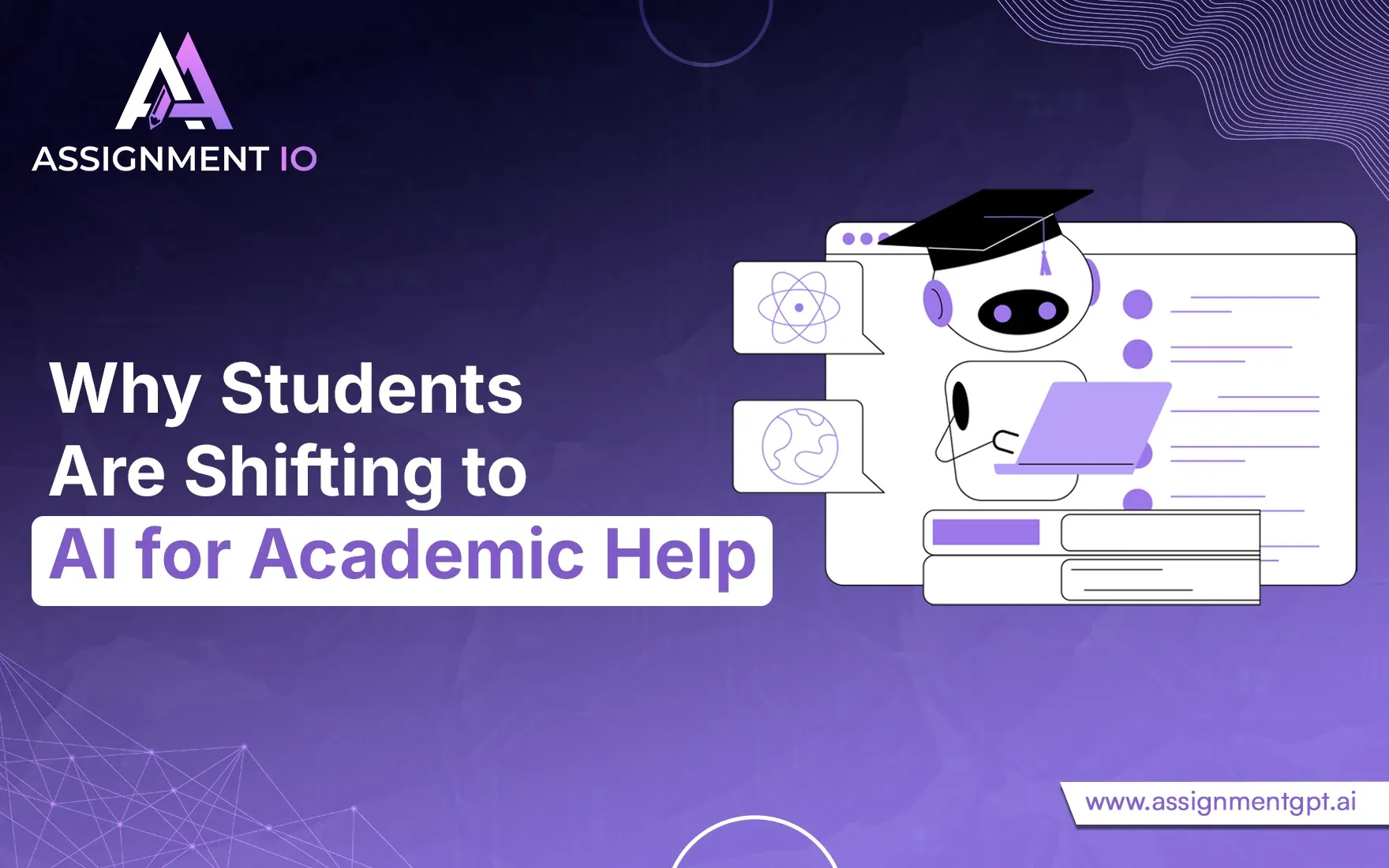Why Students Are Shifting to AI for Academic Help in 2026

Vikas Kukadiya
Undeniably, major changes have taken place in the landscape of education in the last twelve months. Walk into almost any college library today and a certain difference will be recognizable - students are huddled with laptops having conversations with AI assistants rather than using textbooks. This transformation is not just a fad, students and society are looking at and engaging in learning in very different ways now.
Recent studies show that a substantial number of college students are using AI to do their homework, a notable increase from previous years. Artificial intelligence homework help has changed from a tool that students experimented with to a critical resource available in today's high-tech world.
Why is this shift so compelling? The answer is in the unique attributes AI offers to academic support, totally changing the rationale for students to choose AI over a traditional approach.
The Current State of AI in Student Life
It's 2 AM and you're wrestling with a difficult calculus problem. Traditional academic support, such as tutoring centers, study groups, or even motivated teaching assistants, is not available. This is where AI makes a big difference. AI support is available at all hours and has helped transform student living.
The data clearly shows this change. The AIPRM AI in Education statistics show 44% of children use generative AI with more than half of them, 54%, use it to do schoolwork and/or homework. This data from 2026 surveys reveals that AI adoption in education has accelerated far beyond initial predictions.
Additionally, nearly 43% of students report using AI tools to enhance their learning experience, also the AI in education industry anticipates substantial growth is in the education space. Grand View Research estimated that the global AI in education market divers was US$ 5.88 billion in 2024 and expected to expand to US$8.30 billion in 2026. These figures demonstrate that artificial intelligence homework help isn't just a passing fad – it's becoming the new standard for academic support.
The transformation extends beyond simple homework assistance. Students are discovering that AI can serve as a personalized tutor, research assistant, and writing coach all rolled into one accessible platform.
Key Reasons Why Students Choose AI Academic Help
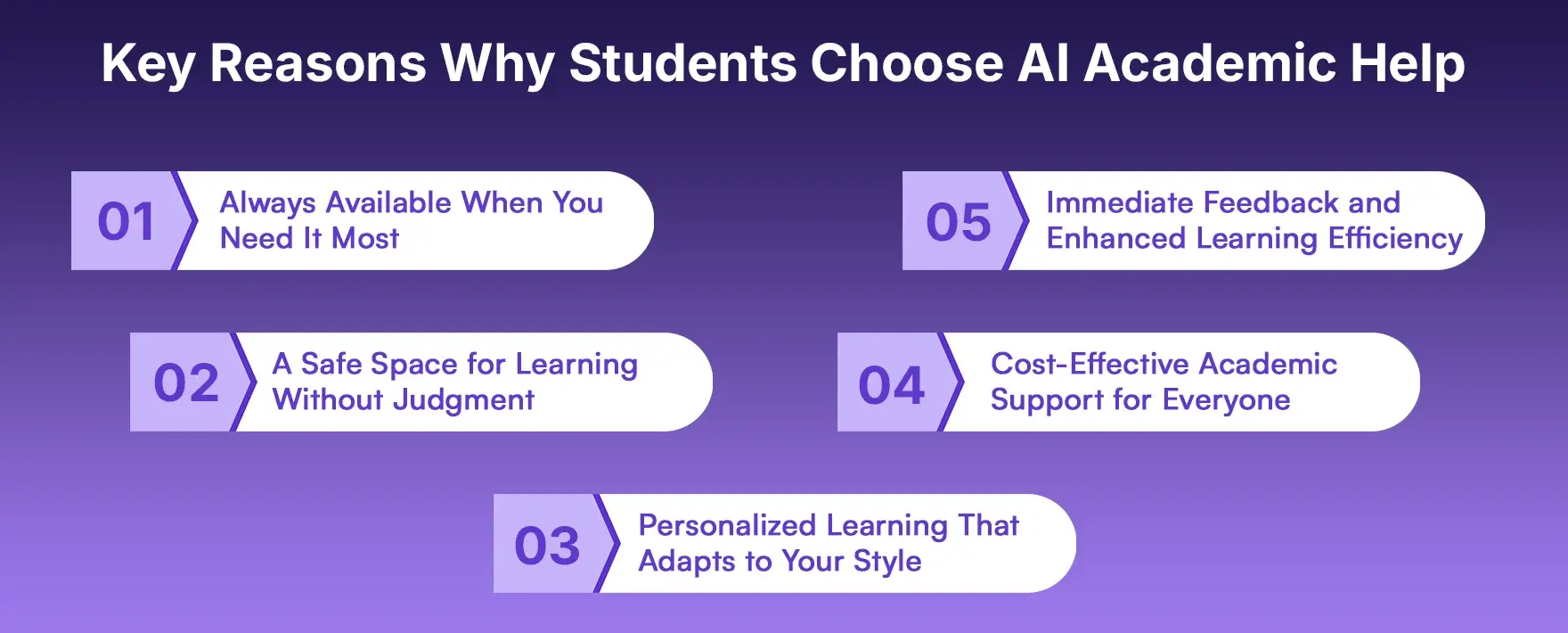
1. Always Available When You Need It Most
Accessibility is the biggest reason students utilize AI. Unlike traditional tutoring services that operate during hours of availability, accessibility with AI for academic assistance is 24/7. Whether students are completing assignments at midnight or engaging in an early morning study session, AI is always available.
No longer do students have to wait until office hours or scheduled appointments to find help. Students do not have to adapt their learning schedule to someone else's timetable, as students can receive help immediately when either confusion arises or excitement for new learning takes hold.
Traditional academic support services often required appointments as far in advance as a week. Travel time or waiting for services was commonplace. Coordination of those schedules took time and energy to align properly. AI academic support eliminates scheduling and waiting, so learning support is as easy as opening a laptop or mobile device.
This instant accessibility is setting a new demand for academic support services. Students expect their help to be available on-demand, therefore restructuring their relationship with learning assistance.
2. A Safe Space for Learning Without Judgment
Some of the rationale for why should students use AI can begin with understanding the psychological benefits of using AI as a part of their learning. Many students shy away from asking questions in classrooms to not be judged by peers or instructors, staring at their feet as they seek to ask a question. AI is completely different – an environment that facilitates curiosity without the addition of social pressure.
A study found that students asked significantly more questions when using artificial intelligence homework help than they did while working with a tutor. In educational settings, asking more questions is positively correlated with understanding and ultimately, positive outcomes.
An environment that is free of judgement, allows students to take their time exploring topics, even making mistakes without being embarrassed. Furthermore, they can ask a "basic" question, without reflecting back on how they would feel if they asked it in class. This psychological safety is essential for effective learning, especially for students already struggling with confidence in school settings.
The opportunity to learn in a non judgemental manner has fostered new pathways for engagement in student learning. Many students that would have not contributed in a traditional classroom setting, are now active participants in their learning by engaging in AI interactions.
3. Personalized Learning That Adapts to Your Style
One of the most advantageous features of AI tutoring is its ability to provide real-time adaptation to the students' individual learning styles. While traditional classrooms generally operate as a one-size-fits-all model, AI can tailor explanations based on how the individual student learns best.
AI systems can:
- Alter explanation complexity according to learner understanding levels
- Provide various problem-solving options for different learning styles
- Give individual practice questions that focus in on the areas that require further work
- Record learning progress that indicates trends and areas needing more development
This personalization goes beyond just providing content. AI can also discover when a student is more engaged when they are provided visual examples as opposed to a series of step-by-step explanations, and it can identify when a student needs to practice with the foundational concepts before they are able to tackle the advanced problems.
As a result, students are given a personalized learning experience. Systemic personalization at this level can only be experienced through expensive private tutoring; AI can now afford students a similar opportunity on a regular basis regardless of their financial standings.
4. Cost-Effective Academic Support for Everyone
Financial accessibility is a key factor considered when looking at why do students use AI for academic assistance. Traditional tutoring services often cost $50-100/hr and can be cost-prohibitive for many students. AI academic assistance represents high-quality educational support available to students as an affordable alternative.
The gap in cost is significant. While a semester of weekly tutoring sessions can set students back thousands of dollars, academic support tools powered by algorithms can often be accessed for a small fraction of that cost, including many that are offered with free tiers, or for as little $5 or $10/month.
The cost reduced from traditional models does not mean that there is any reduction in quality. Many AI tutoring platforms offer explanations and support that are on-par with, or even better than traditional tutoring services, making them a very appealing option for price-sensitive students.
The use of AI academic support advances equity in academic support. Students from all economic backgrounds now have access to high-quality tutoring assistance, which closes the gap on educational inequality.
5. Immediate Feedback and Enhanced Learning Efficiency
AI assists students by giving immediate and direct feedback and reminders or explanations needed for the material, which means students do not get stuck on issues as long as they could. Efficiency is a big reason why students utilize AI; this feature of AI tutoring avoids making a study session frustrating and instead can turn it into a productive learning experience.
Studies suggest that artificial intelligence (AI) homework help can decrease homework completion times and increase couple rates of comprehension. According to a research study published in MDPI's Educational Sciences journal (formerly children's literature in 2021), students reported that AI tools saved them vast amounts of time while completing homework chores like researching, processing information, and automating things that were repetitive tasks The Impact of Artificial Intelligence (AI) on Students' Academic Development. Additionally, AFFiNE research shows that AI tools can halve the time spent on assignments while significantly boosting comprehension . This efficiency gain allows students to cover more material in less time or spend more time on challenging concepts.
Quick feedback loop enables students to fix errors before they become habits. Instead of incorrectly practicing for several days or weeks, students can correct errors on the spot! This efficiency creates a positive feedback loop that sustains earning momentum. Students experience more success, which drives them to spend more time on school work.
Also read this article : Best Online Homework Help Websites for Students
How AI is Transforming Modern Study Methods
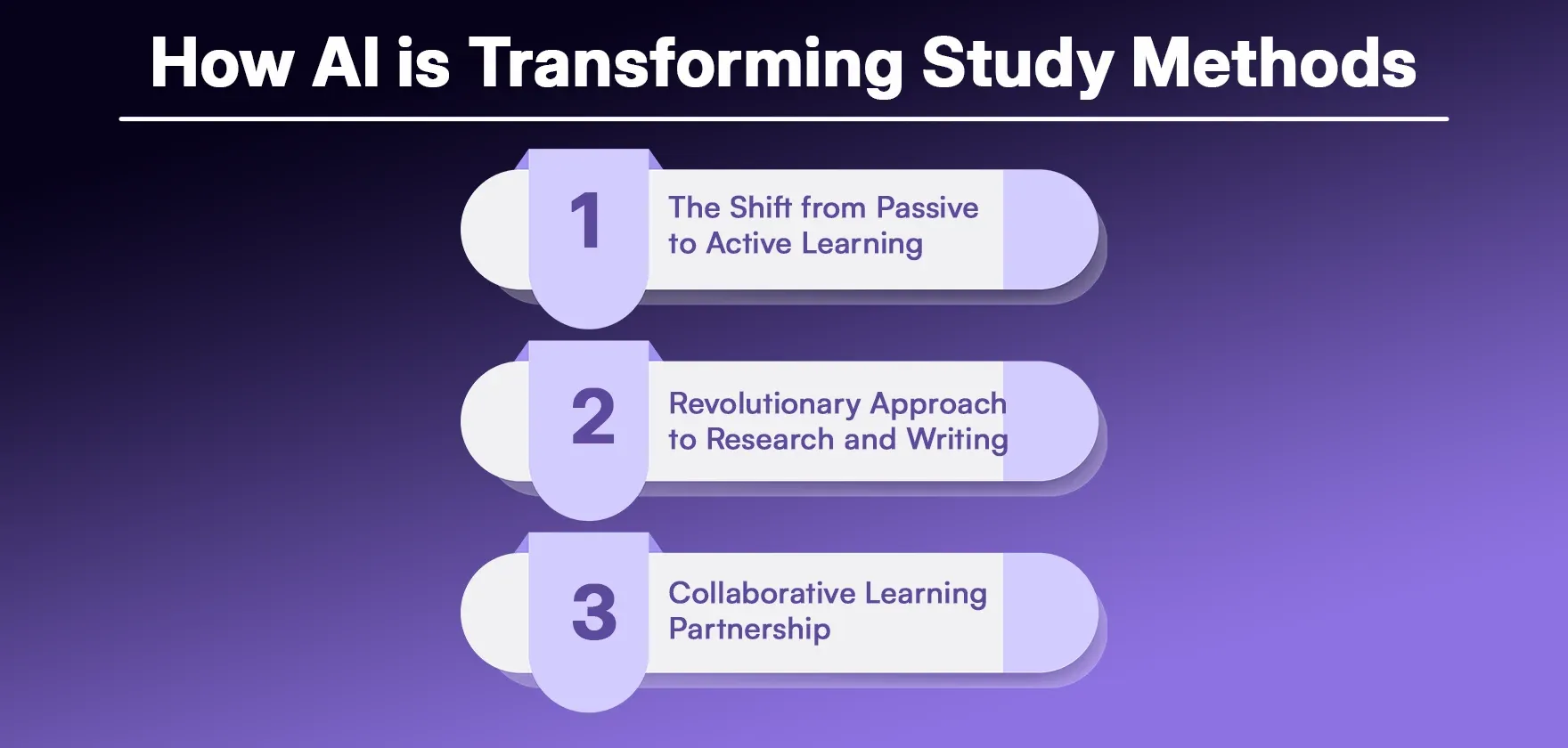
1. The Shift from Passive to Active Learning
Students utilizing AI are making a fundamental shift from passive learning to active learning. Instead of primarily reading textbooks or listening to lectures, they are actively engaging in conversations with AI tutors, asking follow-up questions, and exploring topics in different ways.
This fundamentally changes and clarifies why students should utilize AI to complement traditional study habits, not replace them. AI tutors promote necessary thinking and the opportunity to engage with material to a deeper degree considering its interactivity. The interactive nature of AI tutoring exemplifies a modern take on the Socratic method of teaching where learning occurs through dialogue instead of simply absorbing information. In this way, students are naturally asking themselves questions about "why," "how," and other forms of enquiry.
Engaging in learning in this active way creates a more memorable and meaningful learning experience. First-hand engagement promotes retention better than passive reception because students engaged in discovering learn more effectively.
2. Revolutionary Approach to Research and Writing
Artificial intelligence homework help has transformed how students approach research and writing tasks. AI can:
- Summarize academic papers
- Identify relevant sources
- Suggest research directions
- Assist with brainstorming and structuring arguments
- Help overcome writer's block
- Provide real-time grammar checking and style suggestions
This infrastructure gives a student support methodology to finally make sense of the ambiguous academic writing process with confidence and ease. Instead of spending considerable time staring at a proverbial blank page in anguish, students will use AI to ideate and eventually structure their thoughts.
The research assistance component is particularly relevant in today's information-heavy world. Students will look at AI to help them find credible, relevant sources instead of spending hours searching and thinking that they do not exist. This will save time and effort and have a positive impact on the quality of their research.
Our framework supports thinking differently as a collaborative effort, rather than simple support. Students learn how to utilize AI as a collaborative partner in both the creative and analytical process.
3. Collaborative Learning Partnership
Students today perceive AI as a partner rather than a competitor to thinking. This idea of a partnership reinforced the capacity for critical thinking while providing essential support. This idea also offered students a new way to approach working with others in human-AI cooperation skills that will be needed during their future careers. Students can optimize the unique strengths of human thought while offering their own creativity, critical thinking, and understanding of context.
A partnership model provides students an opportunity to preserve ownership of their learning process. Rather than a passive consumer of AI-generated content, students critically engage with the material, ask questions, and use the material as a springboard for their own ideas.
Students receive their learning from a collaboration format will be a better preparation for a future workforce where you interact with AI. Students are developing skill sets that will be useful well beyond their academic careers.
Measurable Benefits of AI for Student Learning
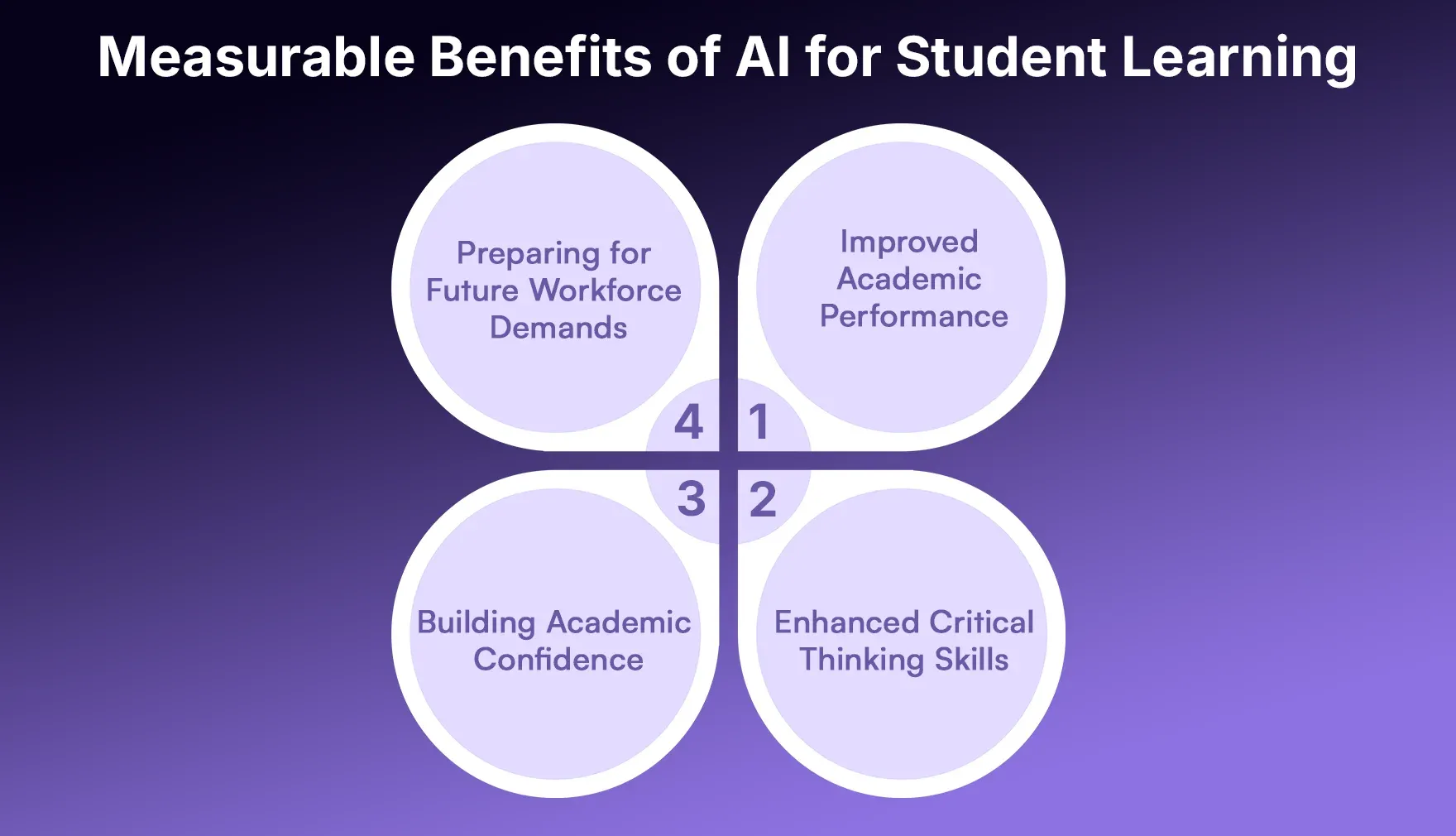
1. Improved Academic Performance
The academic benefits of AI tutoring are becoming increasingly clear through research and student outcomes. Studies indicate that students using AI tutoring demonstrate:
- 25% higher test scores on average
- 30% faster problem-solving abilities
- 40% better retention of complex concepts
These improvements are a result of the personalized and prompt feedback AI provides. Students can identify and remediate knowledge gaps in real time, resulting in a deeper understanding of the content.
The never-ending support in terms of AI means, students are able to keep working on their studies without having to wait for help, thus leading to more consistent progress moments in their studies.
The improvements themselves are a positive cycle for their academic success. As students have better experienced outcomes, they will be more engaged with their studies.
2. Enhanced Critical Thinking Skills
Contrary to concerns about AI making students lazy, AI academic assistance actually promotes critical thinking by:
- Encouraging students to ask better questions
- Providing multiple perspectives on problems
- Teaching evaluation of AI-generated content
Students are learning to doubt AIs' recommendations, validate information, and be reflective about their responses. This is an important development for both their academic outcomes as well as preparation for careers.
Working with an AI is also an opportunity for students to develop the process of asking better questions and prompts, which allows for growth in both their communication and analytical skills.
Critical thinking skills extend beyond the academic environment. Students gain intellectual tools that can be useful throughout their lives.
3. Building Academic Confidence
AI study tools help build academic confidence through:
- Patient, non-judgmental responses
- Repeated explanations without frustration
- Positive reinforcement and encouragement
AI tutoring has proven to not only bolster confidence among students who have felt disenfranchised or disempowered by traditional learning environments, but it also allows them to ask questions without being judged, providing a secure avenue for their intellectual participation.
This confidence building is especially necessary for students who have faced barriers to their learning in previous scenarios. AI provides a space for students to rebuild their relationship with learning after they have encountered frustration or difficulty.
Greater confidence leads to increased engagement and risk-taking in their academic lives. More students get back to tackling complex problems and working their way through difficult topics when they are willing to take the risk.
4. Preparing for Future Workforce Demands
Students learning to work with artificial intelligence homework help develop crucial 21st-century skills including:
- AI literacy and prompt engineering
- Critical evaluation of AI-generated content
- Human-AI collaboration techniques
- Digital problem-solving skills
Recognizing why students use AI currently allows us to see how students are equipping themselves to be successful in a future workforce where collaboration with machines will become vital to the success of their work. In addition, these skills known as RI or Robots Intelligence Skills offer students an advantage in the job space, which is becoming increasingly integrated with AI.
The reason early exposure to AI tools is beneficial is that students have an opportunity to see the capabilities and limitations of artificial intelligence, which will help them understand how to use these tools in successful careers.
This opportunity presents students a distinct advantage when entering jobs. Employers are continuing to seek candidates who can effectively work with machines.
Addressing Challenges and Concerns
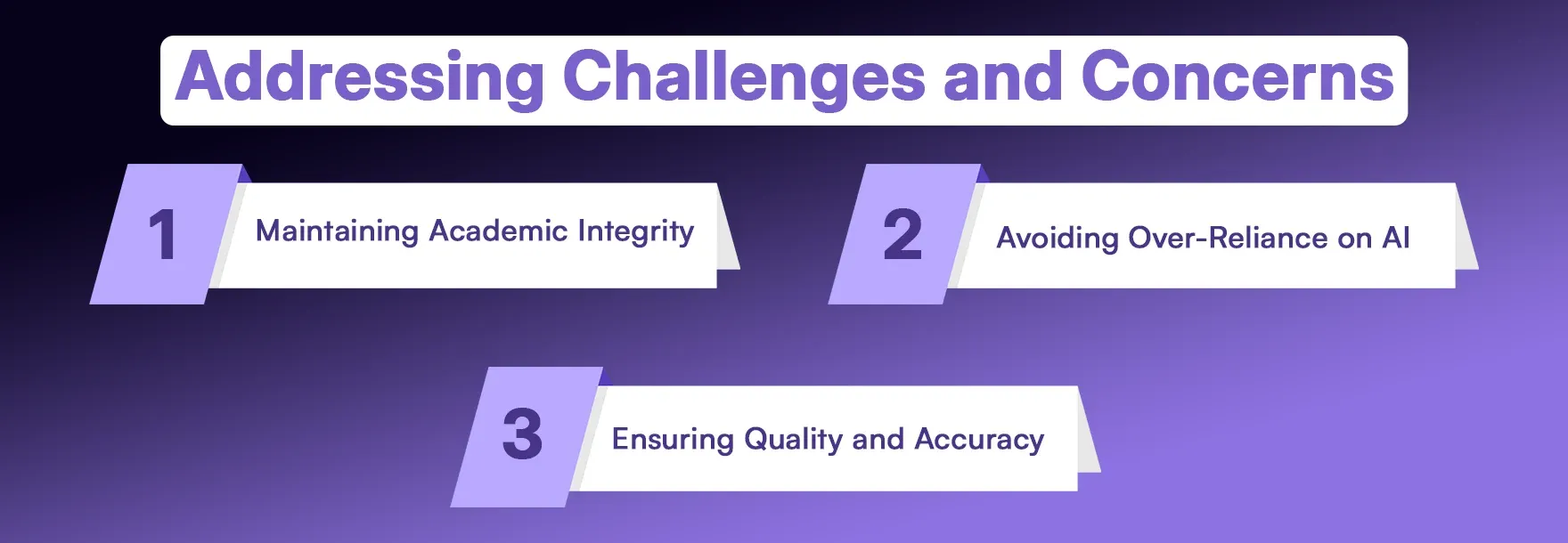
1. Maintaining Academic Integrity
The emergence of AI for academic support raises significant questions about academic honesty and academic integrity. As educational institutions have started to navigate the spectrum of appropriate AI use and expectations for academic integrity, it will be important to establish guidelines so these three concepts can coexist.
It is critical that students can learn to use AI in a healthy way by fundamentally understanding that AI should assist their learning versus a shortcut to simply completing an assignment. This also includes an understanding of the skills needed around using AI in an ethical way as well as understanding the limits of fidelity and appropriateness of AI assistance.
Additionally, students must now appreciate the need for transparency when using AI in their postsecondary studies.
For example, students should recognize when and how make disclose if they have sought AI support with their academic work. Ultimately, it is about balancing the advantages of using AI in their academic work with the maintainance of academic honesty. This will require an ongoing conversation amongst students, mitigators, and institutions.
2. Avoiding Over-Reliance on AI
While AI tutoring has great advantages, students have to be careful not to become reliant on the AI. The intent is to use the AI as an education support tool, not a think-for-you tool. Finding this balance will take practice and intentionality. Student must consistently gauge whether their use of the AI is to spur their learning or they are using it to get out of using their brain to problem solve. The educational community and AI developers are working in collaboration to build tools that promote learning instead of dependancy. The answer is to teach students the thoughtful and strategic use of AI. This will require literacy of AI in conjunction with traditional academic thinking skills.
3. Ensuring Quality and Accuracy
Not all AI academic assistance is created equal. Students need to develop skills to:
- Verify AI-generated information
- Cross-reference multiple sources
- Understand AI limitations and biases
The ability to critically evaluate research information is an important skill in studies and professional readiness. Students must be adept at evaluating AI-generated content. The skill of determining which AI tools are sound and can generate output that can be analyzed is becoming an important aspect of being an academic.
The quality of the output we have access to will rely heavily on the development of informed critical users. Students need to be educated on AI literacy to use these tools effectively.
Read More : Best Educational AI Tools For Students
Best Practices for Effective AI Integration

1. Strategic Implementation
Effective use of AI study tools requires strategic thinking about when and how to use AI assistance. Students should:
- Use AI to understand concepts rather than just complete assignments
- Verify AI responses with authoritative sources
- Combine AI assistance with human feedback
This strategic approach maximizes the benefits of AI while also allowing for academic integrity and effectiveness in learning.
The emphasis here is on seeing AI as just one tool, albeit powerful, amidst the other tools we have to solve academic challenges.
Strategic usage of AI is amplification of, not a replacement for critical thinking. Students who are purposeful and thoughtful in their usage or approach to AI understand better learning outcomes.
2. Maintaining Human Connection
While AI tutoring is valuable, students should maintain:
- Regular interaction with professors and peers
- Participation in study groups and discussions
- Engagement with human mentors and advisors
The human element can be essential for establishing communication and interpersonal skills, as well as diverse points of view that cannot be found in AI.
Through a combination of AI and human interaction, it can create more complete educational experiences.
The goal is to augment our experiences, not replace them. AI should enhance human interaction not take the place of it.
3. Developing AI Literacy
Essential skills for AI academic help include:
- Crafting effective prompts
- Evaluating response quality
- Understanding AI capabilities and limitations
These skills are becoming just as valued as traditional academic skills, so students need direct instruction as to how to utilize AI systems effectively and efficiently.
AI literacy education should generate curriculum rather than being a component of a subject.
AI literacy is significantly and fundamentally becoming a core skill for both academic and professional success. Students with AI literacy need systematic instruction in these competency sections.
The Future of AI in Academic Support
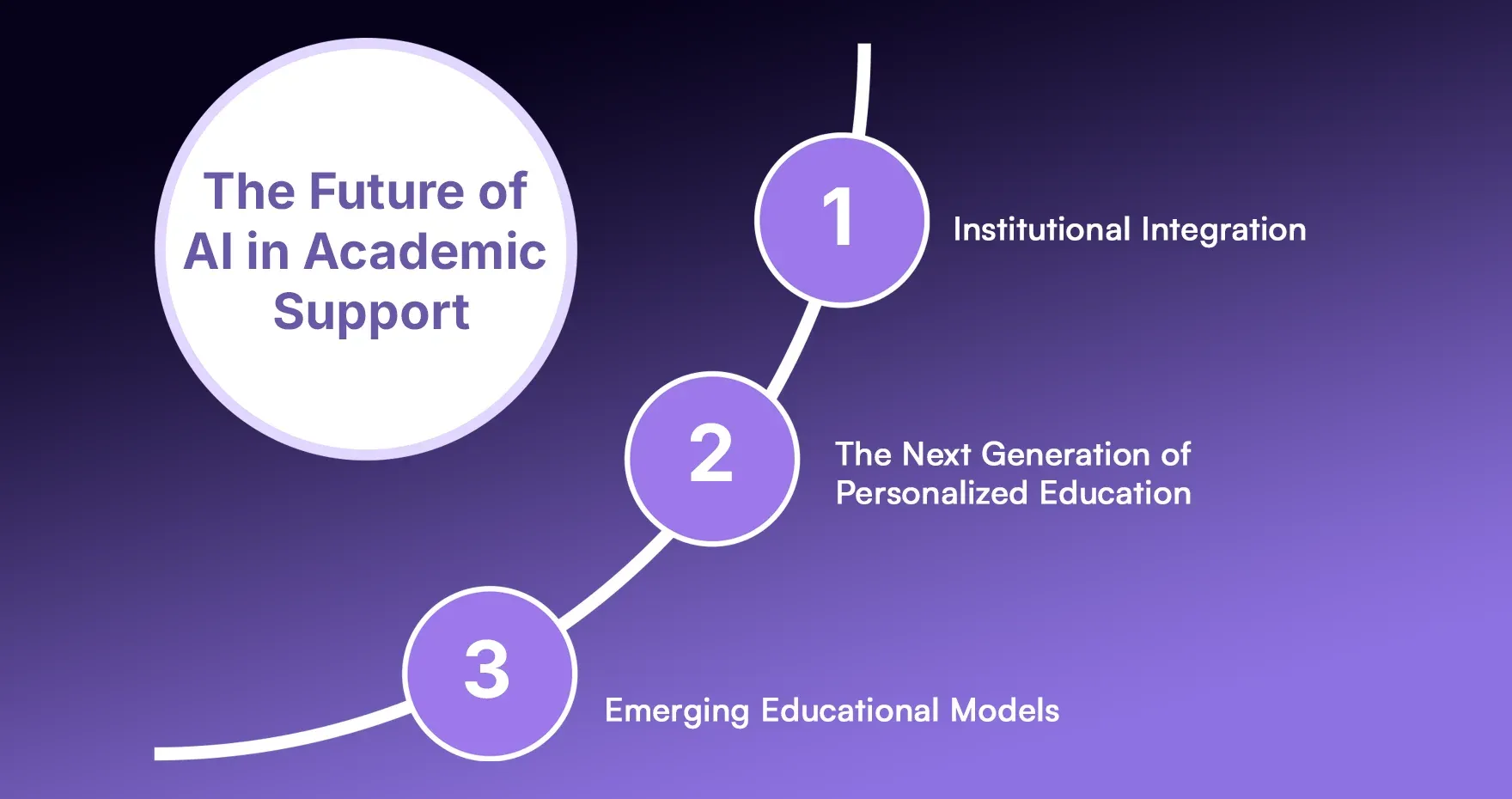
1. Institutional Integration
Educational institutions are moving beyond resistance to embrace AI in education. Forward-thinking schools are:
- Developing AI literacy curricula
- Creating ethical AI use guidelines
- Integrating AI tools into learning management systems
This institutional support is an essential feature of AI adoption with benefits, mitigating risks. Schools need to support use of AI within a framework and guidance.
The process of integrating AI into education, educators, technologists, and students work collaboratively to develop policies and practices.
Institutional support is vital in order for AI adoption to be successful. Schools need to take a proactive stance in AI adoption.
2. The Next Generation of Personalized Education
The future of AI academic assistance includes:
- Fully personalized learning paths
- AI-powered virtual teaching assistants
- Adaptive assessment systems
- Real-time learning analytics
These advancements will create opportunities for unique, individual education at scale.
The technology is progressing toward AI forms that can adapt to individual learning styles, interests, and goals in real-time.
The future of education is going to be personalized and adaptive. AI will enable individualized learning experiences.
3. Emerging Educational Models
AI for academic help is enabling innovative educational approaches including:
- Flipped classrooms with AI support
- Competency-based learning programs
- Micro-learning modules
- Global virtual classrooms
These models represent paradigm shifts in the method and experience of education.
The flexibility and accessibility of AI tools are enabling new possibilities for education that are practical and scalable.
AI is accelerating innovation in the way educational models are being developed. We're experiencing brand new ways to learn and teach.
Conclusion
Education undergoes a fundamental change through AI-enabled learning because students now experience an entirely new approach to knowledge acquisition and future readiness. The educational tool known as artificial intelligence homework assistance started as an experimental approach before becoming a necessary resource which provides 24/7 availability with individual learning adaptations at affordable costs and immediate responses.
Academic assistance through AI enables students to develop critical thinking abilities and build self-confidence while preparing themselves for a world which will integrate human-AI teamwork as a normal practice. The path to success demands students to master AI literacy while upholding academic integrity and to combine AI tools with personal human involvement.
Education will witness accelerated AI implementation which leads to customized learning environments and educational frameworks that were unattainable during the previous years. Students who learn to connect with AI effectively today will gain substantial benefits in the transforming educational environment.
Students who understand artificial intelligence homework help as a tool for enhancing human intelligence instead of substituting it will shape the future educational landscape. Students who achieve this balance between human and AI will have the best chance to succeed in upcoming challenges and opportunities.
FAQs
1. How does AI homework help actually work for students?
AI homework help operates through real-time, personalized assistance via conversational interfaces. Students can pose questions in plain language and the AI will provide explanations based on their respective levels of understanding. The AI will be able to frame complex problems into smaller, manageable steps, provide multiple ways to solve and also be able to offer practice problems to reinforce students understanding. The system learns from student interactions to provide consistent support which become relative to the students level of understanding.
2. Is using AI for homework considered cheating?
Using AI for homework is not considered cheating outright, but depends on how AI is used and the policies of respective institutions. Using AI to understand concepts, receive explanations, and practice problems can be acceptable. However, using AI to complete the entire assignment or submitting work as if it were your own that is generated by generative AI generally goes against the academic integrity policies of the institution. Students should always be educated in their institution's policies and always be transparent about AI involvement when applicable.
3. What are the main advantages of AI tutoring over traditional tutoring?
AI tutoring has 24/7 availability, looks like a cheaper type of opportunity, allows for personal projection of learning, immediate feedback, and working in a non-judgmental environment. AI in ways cannot demonstrate of course consumer behaviorally innocent atmosphere consumes significant amounts of time, travel and money. Will have freedom to meet your learning style with the unlimited potential in AI - with ease Also A.I as is stated is simply not capable in ways of representing human experience and available opportunities Consider naming an experience to come with positive comments A.I is best seen as a supplement and not just an alternative!
4. How can students avoid becoming too dependent on AI for learning?
Students can avoid overreliance on AI by using it purposefully instead of reflexively. This would mean that they would first try to solve problems independently, only use AI for understanding not answers, fact-check AIs answers with further research, and schedule study time free from AI. Students should also interact with human instructors and other students, use them for group study, have collaborative discussions, and practice applying their knowledge in situations where AI is not available.
5. What skills do students need to use AI effectively for academic help?
Successfully using AI requires acquiring a number of important skills - including prompt crafting to develop clear and specific inquiries, critical evaluation to determine the quality of AI responses, information verification to cross-check information presented by AI, and understanding AI's limitation and potential bias. Students also need to learn to recognize when AI should be used for support, and when human support is required. These AI literacy skills are becoming increasingly important, alongside the more traditional academic skills.
6. How accurate and reliable is AI for academic assistance?
AI accuracy for academic assistance has improved significantly but isn't perfect. AI systems can provide excellent explanations for well-established topics but may struggle with cutting-edge research, highly specialized subjects, or tasks requiring recent information. Students should always verify important information through authoritative sources, especially for high-stakes assignments or exams. The key is learning to use AI as a starting point for learning rather than a final authority.
7. What should students do if their school doesn't allow AI use?
Students should respect their institution's policies while advocating for thoughtful AI integration. This might involve participating in discussions about AI policies, demonstrating responsible AI use, or proposing pilot programs for AI-assisted learning. Students can also focus on developing AI literacy skills for future use and engage with AI tools for personal learning and skill development outside of formal assignments.
8. How is AI changing the skills students need for academic success?
Artificial intelligence is creating demand for different skill sets while still valuing traditional academic skills. Students now require AI literacy, skills for critical review, and skills to effectively work with AI systems. However, creativity, critical thinking, communication, and ethical/rational reasoning remain vital. The goal is a balanced skill set that incorporates not only technological competencies, but also the human skills AI will never be able to replicate.
Latest Blog's
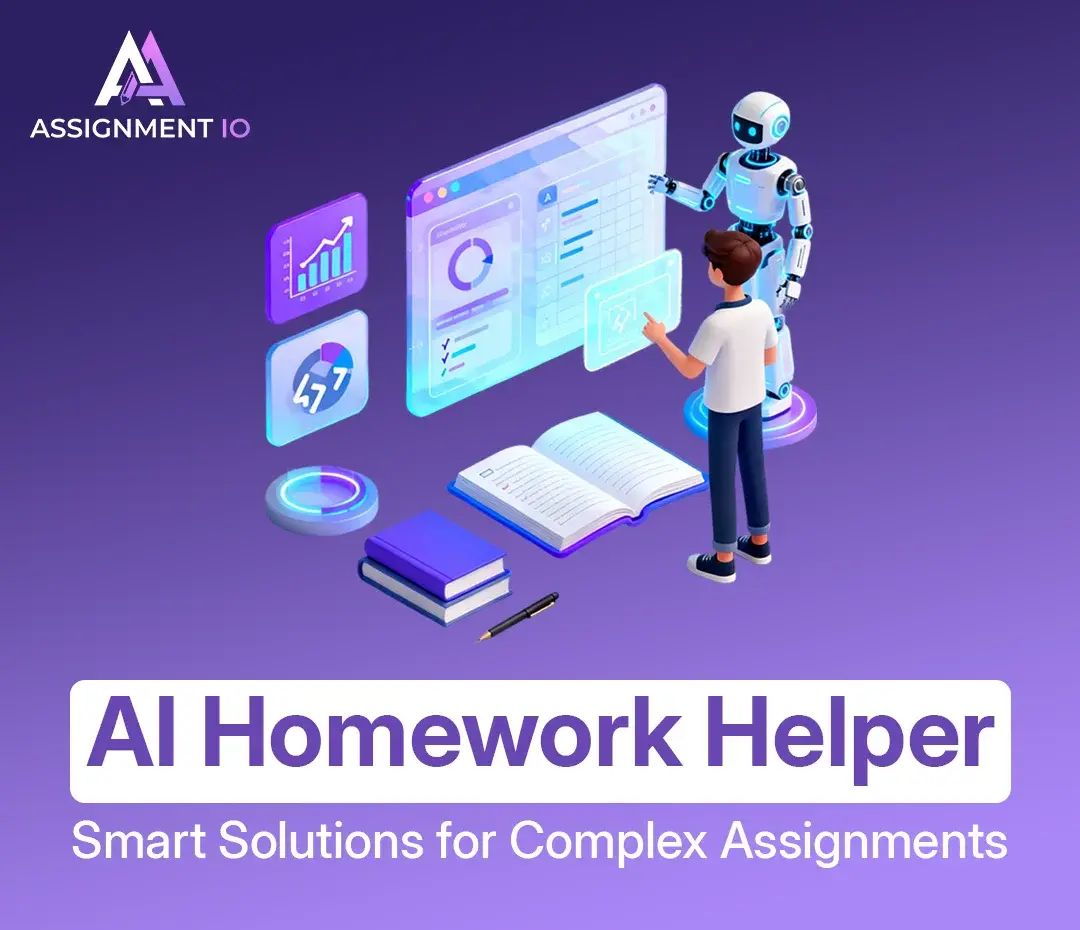
AI Homework Helpers offer fast solutions, personalized learning, and round-the-clock study support for students in every subject.

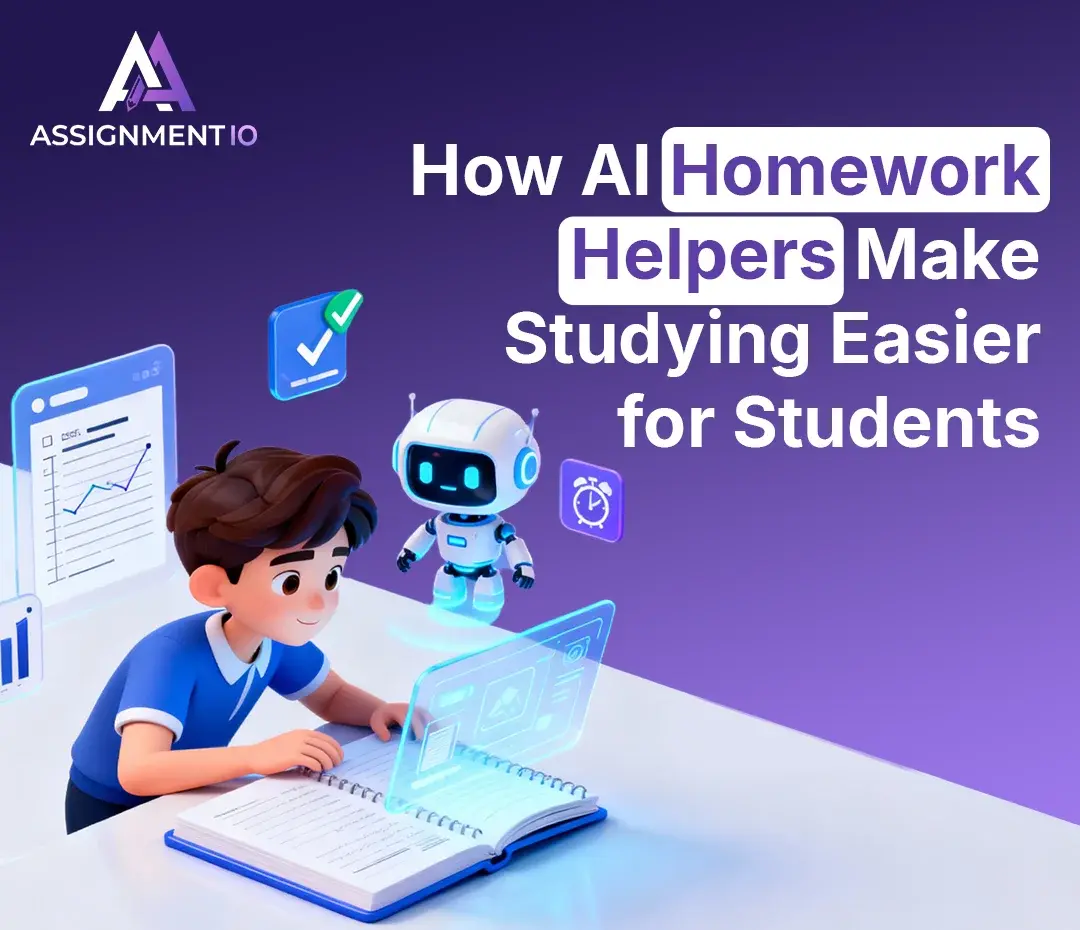
Master exams with superior scores and less study time. Step-by-step tips using ChatGPT, Khanmigo, and Quizlet.

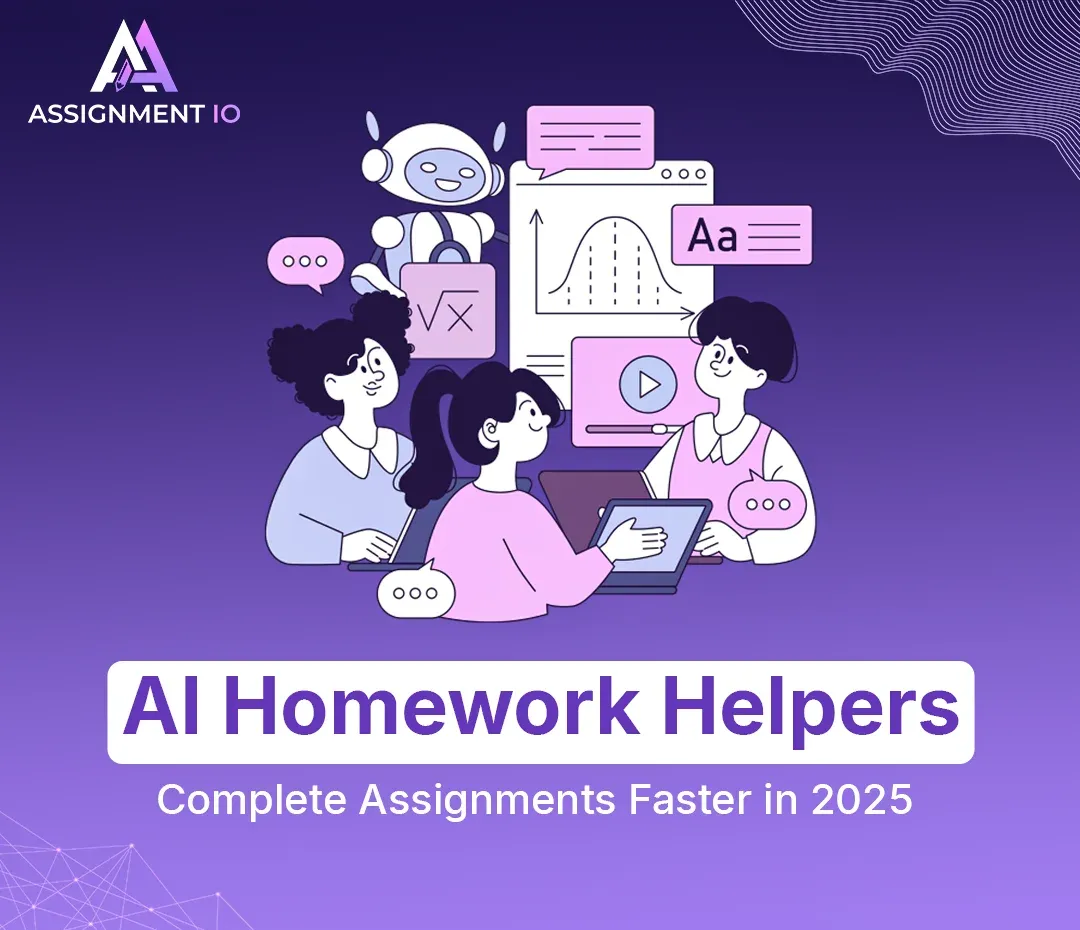
AI homework helpers streamline research, writing, and studying so students learn faster and complete assignments with less stress.

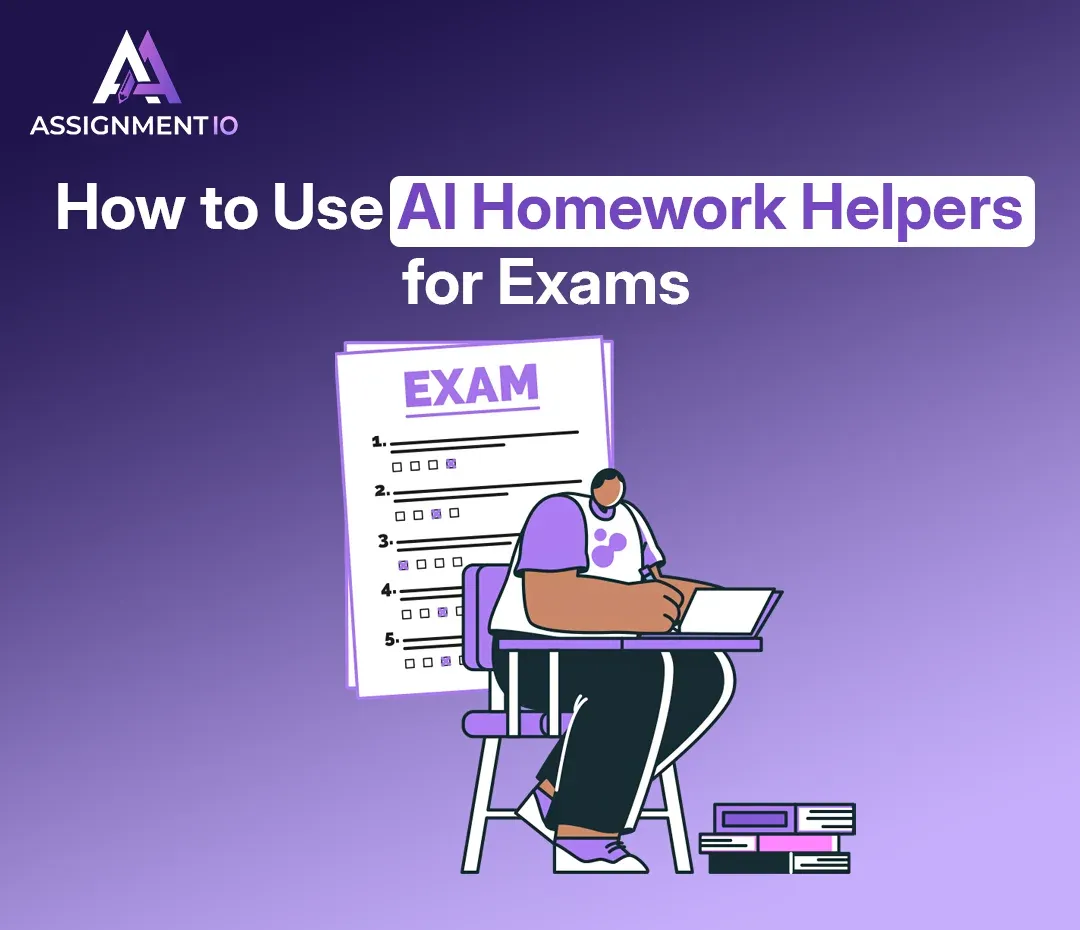
Master exams with superior scores and less study time. Step-by-step tips using ChatGPT, Khanmigo, Quizlet.

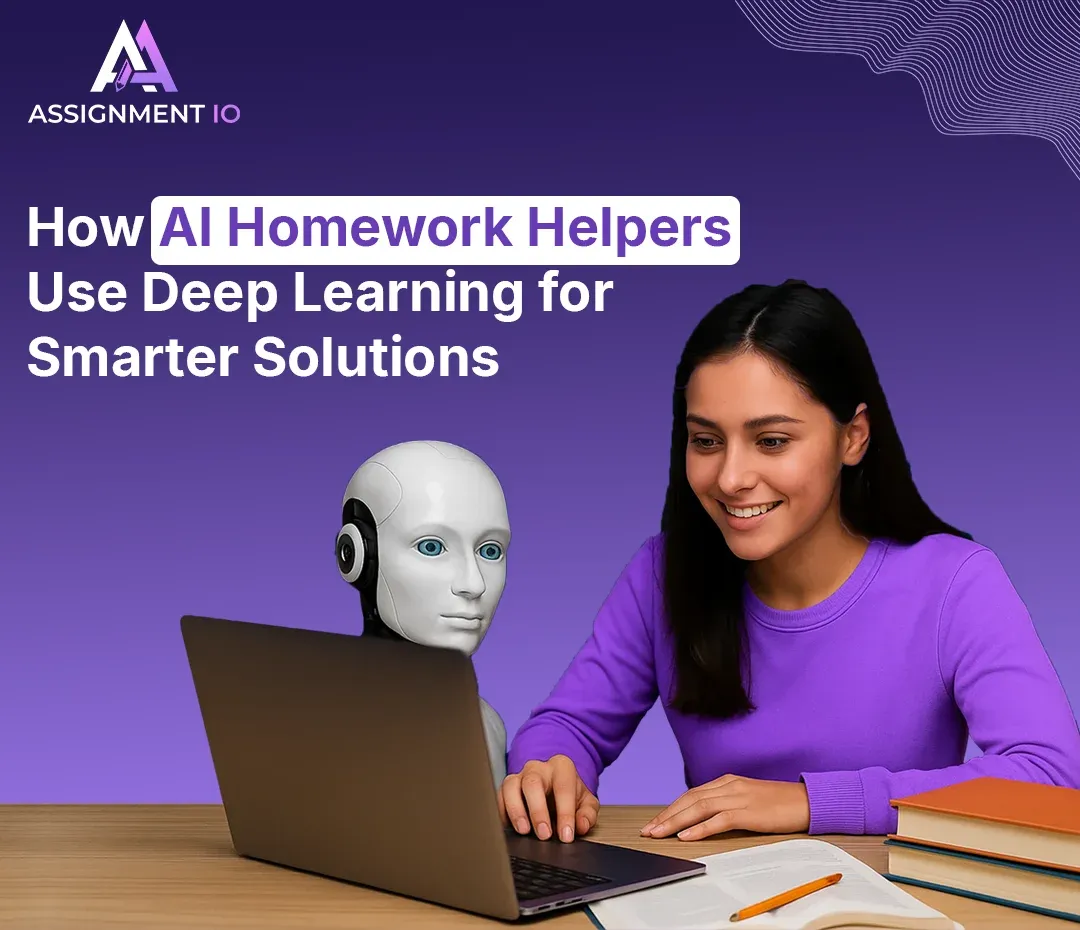
How deep learning makes AI homework helpers smarter, faster, and more personalized for students.

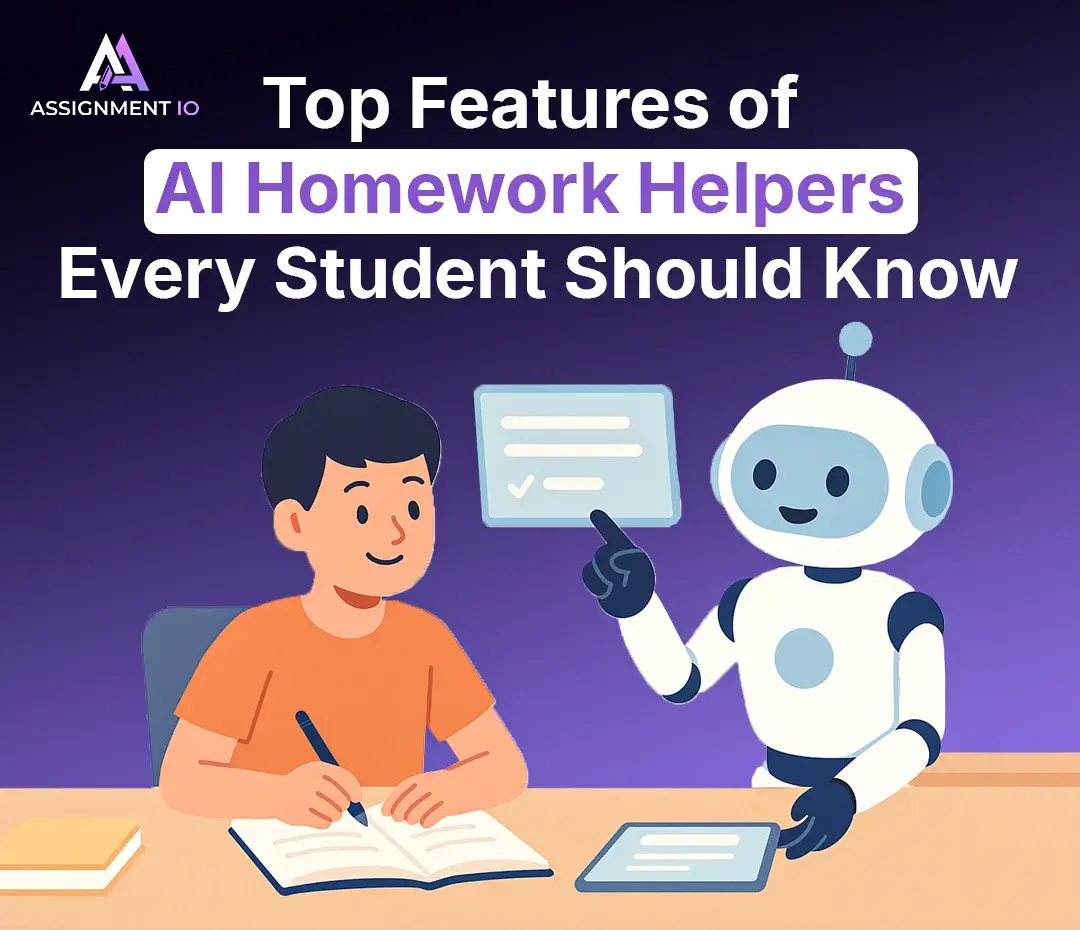
How AI homework helpers save time, boost learning, and provide personalized study support.

